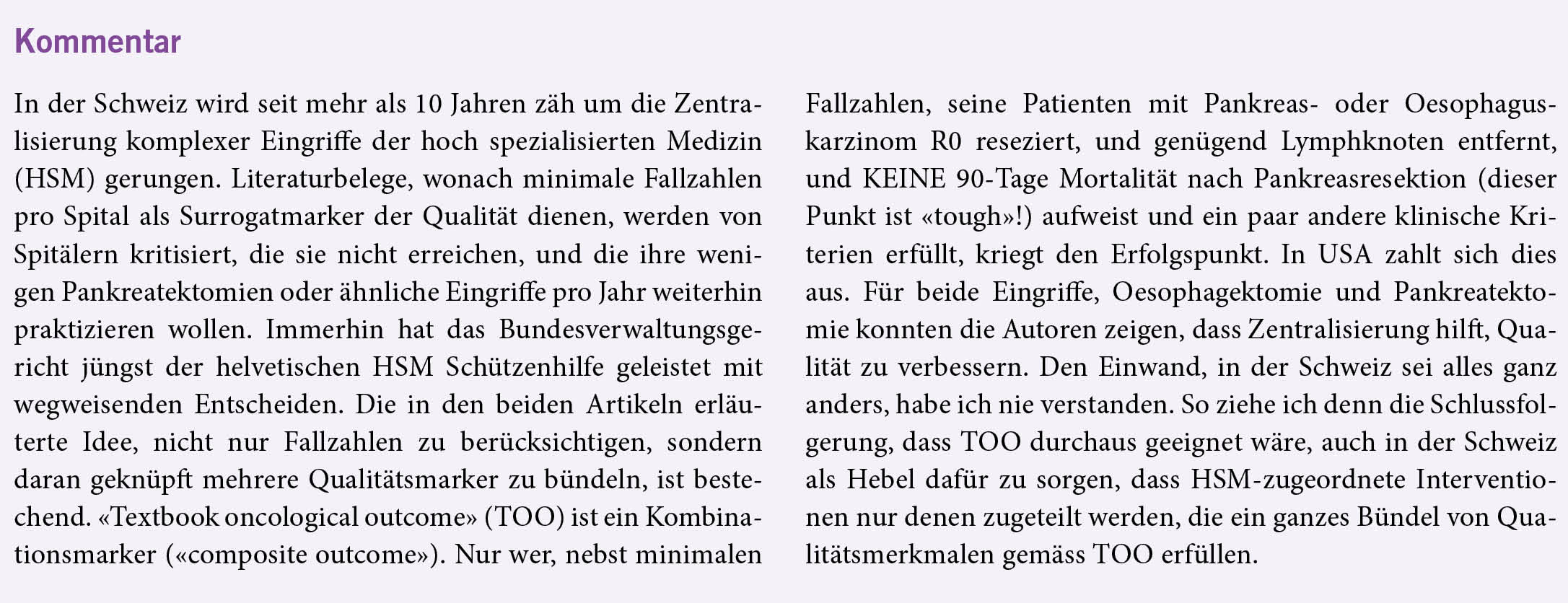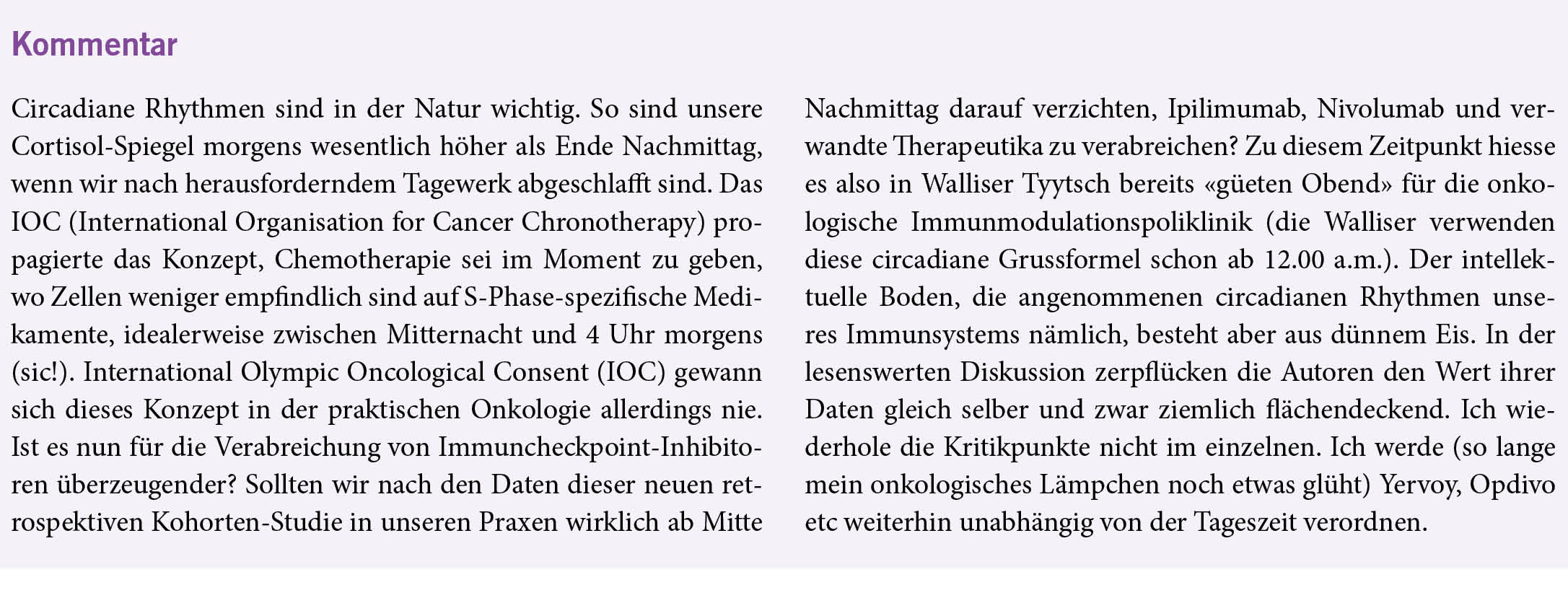- Textbook oncological outcome als Qualitätsmarker
Präambel in eigener Sache
Dies ist mein letzter Beitrag zu «info@onkologie». Ich werde im Laufe des Jahres 2022 meine klinische Tätigkeit definitiv niederlegen; sie wäre ja der unabdingbare Boden für eine fortgesetzt glaubwürdige Einschätzung der Fachliteratur.
Es hat mir Spass gemacht, zu Handen von «info@onkologie» PubMed nach diskussionswürdigen Artikeln und anderen Publikationen zu durchkämmen, und mehr oder weniger scharfsinnige Kommentare zu schreiben. Ob der Spass auf der Leserseite sein Echo fand, weiss ich nicht genau. Der Reaktionen waren wenige. So gehe ich denn – in Analogie zum Emmentaler Bueb, der erst mit 10 Jahren seinen ersten Satz sprach («Muetter, d’ Röschti isch versalze») – davon aus, dass meine analytische Onko-Rösti mehrheitlich nicht als fehlgewürzt gelesen wurde. Die Begründung des Emmentaler Dreikäsehoch für sein langes Schweigen war denn auch: «Es isch so wyt geng alls ir Ornig gsy.» Bei der Wahl der Artikel stöberte ich gerne abseits ausgelatschter Pfade. So mag denn der eine oder andere Artikel, der die Vorzüge eines neuen Medikaments pries, untergegangen sein. Es schien mir jedoch, so auch für die letzte Ausgabe, dass die onkologische Fachliteratur relevante Themen diesseits und jenseits der Diskussion aufweist, ob noch ein weiterer TKI für Lungenkarzinom auf den Markt kommen soll, und ob Immun-Checkpoint-Charlie-Inhibitoren auch adjuvant ihren Dienst tun.
Indem ich fortan in die onkologische Bedeutungslosigkeit versinke, wünsche ich Ihnen allen weiterhin viel Spass an unserem spannenden Fach.
Textbook oncological outcome als Qualitätsmarker
Kulshrestha S et al. Textbook oncologic outcome is associated with increased overall survival after esophagectomy. Surgery 2020; 168: 953-961.
Zusammenfassung: Textbook oncologic outcome was defined as stage-appropriate use of neoadjuvant chemoradiation followed by margin-negative oesophagectomy with formal lymph node assessment and having no prolonged hospitalization, readmission, or 30-day mortality. Textbook oncologic outcome is achieved in a minority of patients undergoing oesophagectomy. It is independently associated with improved overall survival.
idem et al. Textbook oncologic outcome in pancreaticoduodenectomy: Do regionalization efforts make sense? J Surg Oncol 2021; 1. DOI: 10.1002/jso.26712.
Zusammenfassung: Textbook oncologic outcome was defined as a margin-negative resection, appropriate lymph node assessment, no prolonged hospitalization, no 30‐day readmission, no 90‐day mortality, and timely receipt of adjuvant chemotherapy. Regionalization of care for pancreaticoduodenectomy to high volume centers … is associated with improved quality of care.
Randomisierte multizentrische Studie zur Chronotherapie mit Oxaliplatin, Fluorouracil und Folinsäure bei metastasierendem Dickdarmkrebs
Lévi F et al. Randomised multicentre trial of chronotherapy with oxaliplatin, fluorouracil, and folinic acid in metastatic colorectal cancer. Lancet 1997; 350: 681–86
Zusammenfassung: We tested chronomodulated infusion (administered to coincide with relevant circadian rhythms) of oxaliplatin, fluorouracil, and folinic acid compared with constant-rate infusion … in a randomised multicentre trial involving patients with previously untreated metastases from colorectal cancer. Chronotherapy was significantly less toxic and more effective than constant-rate infusion. The results support the concept of temporal selectivity of cancer chemotherapy.
Qian DC et al. Effect of immunotherapy time-of-day infusion on overall survival among pa-tients with advanced melanoma in the USA (MEMOIR): a propensity score-matched analysis of a single-centre, longitudinal study. Lancet Oncol 2021 Publ Online Nov 12, 2021 https://doi.org /10.1016/ S1470-2045(21)00546-5
Zusammenfassung: We aimed to determine whether specific time-of-day patterns of immune checkpoint inhibitor infusions might alter melanoma treatment efficacy. We calculated the association between overall survival and proportion of infusions of immune checkpoint inhibitors received after 16.30 h. Our findings are in line with an increasing body of evidence that adaptive immune responses are less robust when initially stimulated in the evening than in the daytime. … efforts towards scheduling infusions before mid-afternoon could be considered in the multidisciplinary management of advanced melanoma.
Capecitabin versus aktive Überwachung bei Kolonkarzinom mit stabilen Tumorparametern oder in Remission nach 16 Wochen Erstlinientherapie
Adams RA et al. Capecitabine versus active monitoring in stable or responding metastatic colorectal cancer after 16 weeks of first-line therapy: results of the randomized FOCUS4-N Trial. J Clin Oncol 2021; 39: 3693-3704
Zusammenfassung: Treatment breaks in metastatic colorectal cancer (mCRC) are not universally offered to patients despite improvements in quality of life without detriment to overall survival (OS). FOCUS4-N was set up to explore the impact of oral maintenance therapy in patients with mCRC who are responding to first-line therapy. Despite strong evidence of disease control with maintenance therapy, OS remains unaffected. FOCUS4-N provides additional evidence to support the use of treatment breaks as safe management alternatives for patients who are stable or responding to first-line treatment for mCRC.
COVID-19-Impfung bei Patienten, die eine Chemotherapie, Immuntherapie oder Chemoimmuntherapie gegen solide Tumoren erhalten
Oosting FS et al. mRNA-1273 COVID-19 vaccination in patients receiving chemotherapy, immunotherapy, or chemoimmunotherapy for solid tumours: a prospective, multicentre, non-inferiority trial.
Zusammenfassung: Data on the immunogenicity and safety of COVID-19 vaccines for patients with solid tumours receiving systemic cancer treatment are scarce. We assessed the impact of immunotherapy, chemotherapy, and chemo-immunotherapy on the immunogenicity and safety of the mRNA-1273 (Moderna Biotech) COVID-19 vaccine as part of the Vaccination Against COVID in Cancer (VOICE) trial. This prospective, multicentre, non-inferiority trial included four cohorts: individuals without cancer (control), and patients with solid tumours, regardless of stage and histology, treated with immunotherapy (cohort B), chemotherapy (cohort C), or chemo-immunotherapy (cohort D). Most patients with cancer develop, while receiving chemotherapy, immunotherapy, or both, an adequate antibody response to Covid vaccination.
Bern
martin.fey@insel.ch










